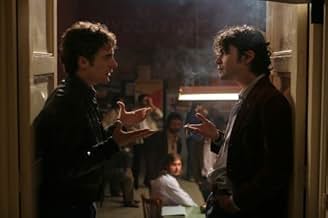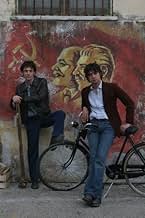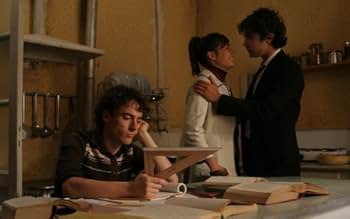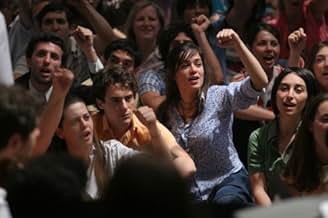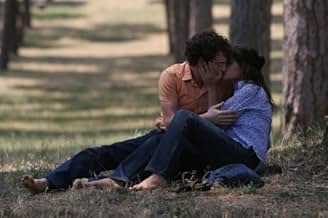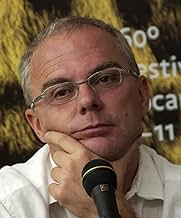IMDb-BEWERTUNG
7,0/10
6864
IHRE BEWERTUNG
Füge eine Handlung in deiner Sprache hinzuTwo brothers come of age in a small Italian town in the '60s and '70s.Two brothers come of age in a small Italian town in the '60s and '70s.Two brothers come of age in a small Italian town in the '60s and '70s.
- Auszeichnungen
- 19 Gewinne & 29 Nominierungen insgesamt
Antonino Bruschetta
- Segretario Bombacci
- (as Ninni Bruschetta)
Empfohlene Bewertungen
I rushed to see this movie, with Elio Germano, perhaps the best Italian actor of his generation, and Riccardo Scamarcio, the heartthrob of the moment. I got upset about the rejection from the snobbish Cannes Festival and I wanted to see the film by myself. Now, after having seen it, unfortunately, I have to agree with the Cannes decision. The film is a tired rehash of other books/films/TV done indifferently and boringly with two saving graces: Elio Germano's and Angela Finocchiaro's performances. The rest is, quite frankly, unendurable. The film felt long, long, long and I got more and more impatient and eventually angry with the whole thing. The Italian cinema that once was a power force of inspiring themes and ideas seems to have arrived to a total dead stop. The artists, I feel, with something new to say, like Libero Di Rienzo - have you seen his "Sangue" with Elio Germano as well? No, I bet you haven't. It was released in secrecy and for my money, his movie had something new to say in a totally new exciting way. I fear we, in Italy, can't move forward because we're trapped in some king of structure that it's terrified of new ideas. As a consequence we have films like this one. A throw back to the past and not in a nice way. Cannes? Are you nuts?
There's this much to be said for this movie from the ranks of Italy's new young directors and actors: The quality of the acting was at least one notch above the usual fare, which almost never transcends the clichéd facial expressions and intonations we expect to find in TV dramas and sit-coms. This new generation of actors and directors was raised on US television imports ("telefilms") and Latin-American soaps, and it definitely shows in the uninspired and uninspiring quality of their work. And one gets the impression that 90% of them come from Parioli, a very well-to-do neighborhood of Rome, that would be the rough equivalent of coming from Santa Monica, Lake Forest IL, or Westport Conn—all those perfectly groomed faces coming from families of the Italian haute bourgeoisie with unlimited funds to advance their children's "acting career." If it weren't for Elio Germano as Accio (as well as Luca Zingaretti as Accio's fascist mentor and Anna Bonaiuto as his wife), this movie would probably fall into the same category of banalized film-making with all the rest.
But Germano's performance is not enough to salvage a film that fails to rise above a rating of "mediocrity +". Certainly it was an interesting idea to situate the action in Latina, a city built from scratch by Mussolini's fascist regime after it had drained the surrounding swamp land (the "bonifica" that was one of Fascism's highly touted achievements). All of the city's architecture was inspired by fascist "monumental" design.
Regrettably, Luchetti has done little of interest to exploit this setting for his family drama other than to bring up the same old cliché of opposing extremisms (the thuggery of the neo-fascist right vs. the banditry and targeted terrorism of the extra-parliamentary left). And the drama of the conflict between these two extremisms is used altogether too much to drive the plot forward. Some Italian commentators disliked this film because it seemed to go over the same old ground in the same old way—when it was time, presumably, to move on to new subjects. But the problem was not that it rehashed Italian history—the problem was the "hash." Bellocchio, after all, did a wonderful job of re-interpreting to Italians the experience of the Red Brigades in his "Buongiorno,Notte".
But here the audience is simply given a choice between fascist hooliganism and a lunatic left, when actually the situation in Italy in the 60s and 70s was much more complicated and nuanced. Millions of Italians belonged to parties and movements that were seriously committed to a progressive transformation of Italy that did not involve knee-cappings and assassinations. And so Luchetti ends up confirming (perhaps despite himself) the American/Berlusconiano vision of the world: "Forget about ideology—it's all about individual freedom and authenticity in your personal relationships." And finally we can see the effects of Berlusconi's TV stations and their ilk also in the movie's script. After 20, I stopped counting how many times the characters said, "Ma Che Cazzo Dici?"("What the f#%k are you saying?"). It is a measure of the moronization of the Italian public under the sway of Berlusconi and Berlusconian media that the scriptwriters think that they can get a laugh out of an Italian audience with this phrase each and every time it is said—and sadly they're probably right.
But Germano's performance is not enough to salvage a film that fails to rise above a rating of "mediocrity +". Certainly it was an interesting idea to situate the action in Latina, a city built from scratch by Mussolini's fascist regime after it had drained the surrounding swamp land (the "bonifica" that was one of Fascism's highly touted achievements). All of the city's architecture was inspired by fascist "monumental" design.
Regrettably, Luchetti has done little of interest to exploit this setting for his family drama other than to bring up the same old cliché of opposing extremisms (the thuggery of the neo-fascist right vs. the banditry and targeted terrorism of the extra-parliamentary left). And the drama of the conflict between these two extremisms is used altogether too much to drive the plot forward. Some Italian commentators disliked this film because it seemed to go over the same old ground in the same old way—when it was time, presumably, to move on to new subjects. But the problem was not that it rehashed Italian history—the problem was the "hash." Bellocchio, after all, did a wonderful job of re-interpreting to Italians the experience of the Red Brigades in his "Buongiorno,Notte".
But here the audience is simply given a choice between fascist hooliganism and a lunatic left, when actually the situation in Italy in the 60s and 70s was much more complicated and nuanced. Millions of Italians belonged to parties and movements that were seriously committed to a progressive transformation of Italy that did not involve knee-cappings and assassinations. And so Luchetti ends up confirming (perhaps despite himself) the American/Berlusconiano vision of the world: "Forget about ideology—it's all about individual freedom and authenticity in your personal relationships." And finally we can see the effects of Berlusconi's TV stations and their ilk also in the movie's script. After 20, I stopped counting how many times the characters said, "Ma Che Cazzo Dici?"("What the f#%k are you saying?"). It is a measure of the moronization of the Italian public under the sway of Berlusconi and Berlusconian media that the scriptwriters think that they can get a laugh out of an Italian audience with this phrase each and every time it is said—and sadly they're probably right.
This film is a dilemma for me. The first half just bounced along. The music was perfect. The energy pulled me along with it, seeing what felt to me like real people's insight into the serious subject matter. Interesting subject matter, interesting characters with motivation, who I cared about. You do laugh at things, even when serious stuff is going on most of the time. I didn't think it could get any better.
And then in a blink of an eye (about an hour in, maybe), it all went to pieces. It dawdled slowly through clichés. I felt like I knew what was coming, and I didn't even care. It was implausible, and at times boring enough for me to lose concentration.
Part of the problem is that it is (as another reviewer noted) about 20 minutes too long. How come are there film directors - talented ones - who haven't yet noticed that 90 minutes is generally enough? 8/10 for the brilliant first half.
And then in a blink of an eye (about an hour in, maybe), it all went to pieces. It dawdled slowly through clichés. I felt like I knew what was coming, and I didn't even care. It was implausible, and at times boring enough for me to lose concentration.
Part of the problem is that it is (as another reviewer noted) about 20 minutes too long. How come are there film directors - talented ones - who haven't yet noticed that 90 minutes is generally enough? 8/10 for the brilliant first half.
MY BROTHER IS AN ONLY CHILD ('Mio fratello è figlio unico') is a title that may confuse the casual movie viewer, but it is an apt summation of the rigorous story that this excellent Italian film by Danielle Luchetti (adapted from a novel by Antonio Pennacchi) represents - the coming of age of two brothers in the confusing and turbulent 1960's and 1970's in Italy. While the film deals with the myriad political factions that disrupted life especially among the students of that era, the main focus of the story is the indomitable brotherly love that bonds the two main characters.
Accio Benano (Vittorrio Emanuele Popizo) as a child is a mischief maker who has entered seminary to become a priest, but his innate search for truth and meaning soon finds him returning home to his little family in a Mussolini-fabricated town called Latina, a village built on promises of communal well-being (a housing project was built but the poor villagers are refused access to it), but languishes in the poverty of lost hopes and deflated spirits. Accio's father, mother, younger sister and older brother Manrico (Riccardo Scamarcio) are making ends meet, but are frustrated with the political oppression of the working class. Time passes and the older Accio (Elio Germano) comes under the influence of Mussolini's 'idealism' with the tutelage of his older friend Mario (Luca Zingaretti) and embraces Fascism while Manrico has aligned with the communists, and it is this dichotomy of belief that sets Accio apart from his brother as well as his family who are communist sympathizers. Accio's personality places him in harms way with the law, with women (he has longings for the women in both Mario's and Manrico's lives), and ultimately with turns of events that threaten to pit brother against brother. The resolution of these conflicts makes for a fascinating study of familial ties, brotherly love, and a keenly observed sociopolitical history of Italy that is as enlightening as it is entertaining.
While Germano and Scamarcio are the obvious stars of this well acted film, the supporting cast (including such fine actors as Angela Finocchiaro, Massimo Popolizio, Alba Rohrwacher, Anna Bonaiuto, and Diane Fleri) is uniformly strong. This epic film demands full attention to the script (Italian with English subtitles) to follow the various political differences, but the tenor of the film is one of the excitement and concomitant love of two brothers coming of age in the best Italian style! It is a joy to watch and a lesson in history about which we should all be aware. Grady Harp
Accio Benano (Vittorrio Emanuele Popizo) as a child is a mischief maker who has entered seminary to become a priest, but his innate search for truth and meaning soon finds him returning home to his little family in a Mussolini-fabricated town called Latina, a village built on promises of communal well-being (a housing project was built but the poor villagers are refused access to it), but languishes in the poverty of lost hopes and deflated spirits. Accio's father, mother, younger sister and older brother Manrico (Riccardo Scamarcio) are making ends meet, but are frustrated with the political oppression of the working class. Time passes and the older Accio (Elio Germano) comes under the influence of Mussolini's 'idealism' with the tutelage of his older friend Mario (Luca Zingaretti) and embraces Fascism while Manrico has aligned with the communists, and it is this dichotomy of belief that sets Accio apart from his brother as well as his family who are communist sympathizers. Accio's personality places him in harms way with the law, with women (he has longings for the women in both Mario's and Manrico's lives), and ultimately with turns of events that threaten to pit brother against brother. The resolution of these conflicts makes for a fascinating study of familial ties, brotherly love, and a keenly observed sociopolitical history of Italy that is as enlightening as it is entertaining.
While Germano and Scamarcio are the obvious stars of this well acted film, the supporting cast (including such fine actors as Angela Finocchiaro, Massimo Popolizio, Alba Rohrwacher, Anna Bonaiuto, and Diane Fleri) is uniformly strong. This epic film demands full attention to the script (Italian with English subtitles) to follow the various political differences, but the tenor of the film is one of the excitement and concomitant love of two brothers coming of age in the best Italian style! It is a joy to watch and a lesson in history about which we should all be aware. Grady Harp
The political backdrop of this 60s character drama is both nostalgic and frightening - that disaffected and rebellious Accio finds himself so easily taken in by a Fascist mentor strikes parallels with the our own young men turning to extremism or street violence in a search of identity. Accio clashes dramatically with his older brother, the hip, good-looking communist, but the story not so much about political ideals as their expression of familial jealousies and personal moral development.
The tensions and affections of this struggling working class family, portrayed by all with genuine emotion. The dialogue is witty and charming and not unlike other memorable Italian films (Il Postino, Cinema Paradiso) the characters come across almost too resoundingly. This gives the film a well-crafted theatrical quality, that is engaging, well-paced and very satisfying.
The tensions and affections of this struggling working class family, portrayed by all with genuine emotion. The dialogue is witty and charming and not unlike other memorable Italian films (Il Postino, Cinema Paradiso) the characters come across almost too resoundingly. This gives the film a well-crafted theatrical quality, that is engaging, well-paced and very satisfying.
Wusstest du schon
- WissenswertesTaken from the novel "Il fasciocomunista", the title has been changed in "Mio fratello è figlio unico" as a tribute to the eponymous song by Rino Gaetano.
- SoundtracksSul mio carro (Chariot)
Performed by Sonia Cruceru
Top-Auswahl
Melde dich zum Bewerten an und greife auf die Watchlist für personalisierte Empfehlungen zu.
- How long is My Brother Is an Only Child?Powered by Alexa
Details
- Erscheinungsdatum
- Herkunftsländer
- Offizielle Standorte
- Sprache
- Auch bekannt als
- My Brother Is an Only Child
- Drehorte
- Produktionsfirmen
- Weitere beteiligte Unternehmen bei IMDbPro anzeigen
Box Office
- Budget
- 5.000.000 € (geschätzt)
- Bruttoertrag in den USA und Kanada
- 255.620 $
- Eröffnungswochenende in den USA und in Kanada
- 9.357 $
- 30. März 2008
- Weltweiter Bruttoertrag
- 12.894.062 $
- Laufzeit1 Stunde 48 Minuten
- Farbe
- Sound-Mix
- Seitenverhältnis
- 1.85 : 1
Zu dieser Seite beitragen
Bearbeitung vorschlagen oder fehlenden Inhalt hinzufügen

Oberste Lücke
By what name was Mein Bruder ist ein Einzelkind (2007) officially released in India in English?
Antwort





